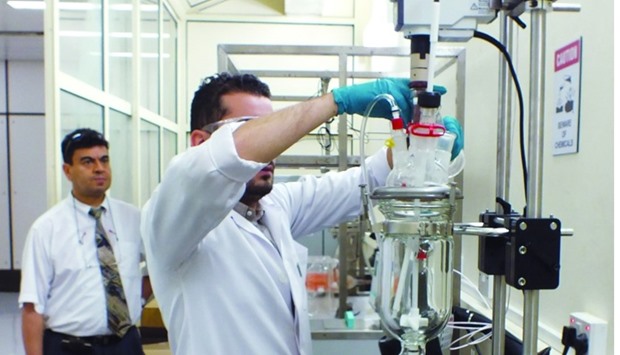The project was supported by QU and a grant under the National Priorities Research Programme (NPRP),
Its outcomes would be of “considerable value to environmental questions being addressed in Qatar and the region”, QU said in a press statement.
The team conducted a “cost-effective bench-scale testing chemistry activity” to draw a chemical reaction between CO2 and salt in brine solutions in the presence of ammonia. They designed chemical reactors where captured CO2 was converted into sodium bicarbonate rather than sodium carbonate, reducing the chemical conversion steps from seven to two. Pure CO2 was used instead of flue gas from power plants, which has about 10% CO2 and other gases and is used in similar processes.
The chemical reaction contributed to reducing the need for brine disposal by nearly 100% ending up with sodium bicarbonate, calcium chloride solution and ammonia for reuse in the first step, thereby making the process efficient.
CENG professor of chemical engineering Dr Farid Benyahia, who led the research, said: “Carbon dioxide and concentrated brine are considered as environmental issues in Qatar and in most of the countries that rely on desalination for freshwater supplies. This chemical reaction scheme contributed to tackling environmental issues by promoting the idea of carbon utilisation, which suggests that CO2 may not be considered as a waste but as a potential valuable resource.
“I am also pleased that this innovative process developed at Qatar University was filed as a US patent and recently awarded an allowance. It can potentially be deployed commercially in the future.”
Hazardous materials engineer at Qatar’s Civil Defence and a previous engineering postgraduate student, Karam ElAhmed, who participated in the research, appreciated QU’s efforts in applied research and expressed hopes to see the outcome of the project applied in the region to mitigate the problem of carbon emissions and reject brine into the sea.

Dr Farid Benyahia and Karam ElAhmed working in the laboratory for the project
A research project conducted by faculty and students at Qatar University College of Engineering (QU-CENG) addressed carbon dioxide emission and desalination brine reject into the sea in the GCC region.
